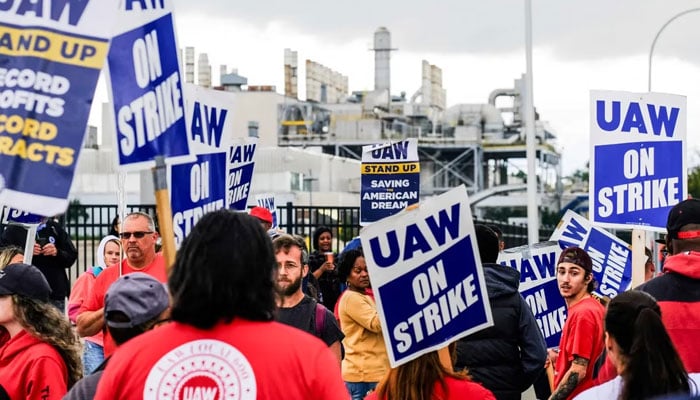7,000 more workers join US auto strike against Detroit giants

[ad_1]

WASHINGTON: The ongoing auto strike in the United States saw another 7,000 workers join the picket lines on Friday, further intensifying the major labor dispute against the top three car manufacturers in Detroit.
Shawn Fain, the president of the United Auto Workers (UAW), issued a call to action, urging employees at Ford and General Motors (GM) plants in Chicago and Michigan to join the unprecedented joint strike against the “Big Three” Detroit automakers, which include Ford, GM, and Stellantis, the producer of Chrysler vehicles.
The primary demands of the striking workers are higher wages and other improvements to their working conditions.
In a message live-streamed on YouTube, Fain explicitly called on employees at Ford’s Chicago assembly plant and GM’s Lansing Delta Township facility to participate in the strike, emphasizing their crucial role in fighting for improved employment terms.
The strike officially commenced at noon Eastern time (1600 GMT) as planned, according to a statement from a UAW official. The central demand of the union is a 40 percent wage increase over the next four years, whereas the car manufacturers have offered raises of around 20 percent.
Additionally, negotiations have centered on the UAW’s desire to represent workers at battery plants planned by Ford, which the auto giant has resisted.
The UAW has strategically employed this targeted strike, initiated on September 15, as leverage to increase pressure on the three auto companies to reach a favorable agreement. As a result of Friday’s industrial action, the number of UAW members on strike across 21 states in the United States has now exceeded 25,000 workers, constituting approximately 17 percent of the union’s membership.
Ford President Jim Farley, who had maintained relative silence on the issue until now, criticized Fain’s negotiation tactics on Friday. Farley believed that a compromise on pay and benefits could have been reached, but he accused the UAW of holding the deal hostage over battery plant issues.
This strike has not only impacted the auto industry but has also taken on political significance, particularly in the swing state of Michigan, in the lead-up to the 2024 presidential election.
Earlier this week, President Joe Biden became the first sitting U.S. president to join a picket line, standing alongside UAW members in Michigan to garner support from blue-collar voters. In contrast, former President Donald Trump also visited Michigan, vowing to protect American labor.
Fain considered Biden’s visit a “historic day” and underscored the power of solidarity in achieving economic and social justice, emphasizing that unity could accomplish remarkable outcomes.
[ad_2]